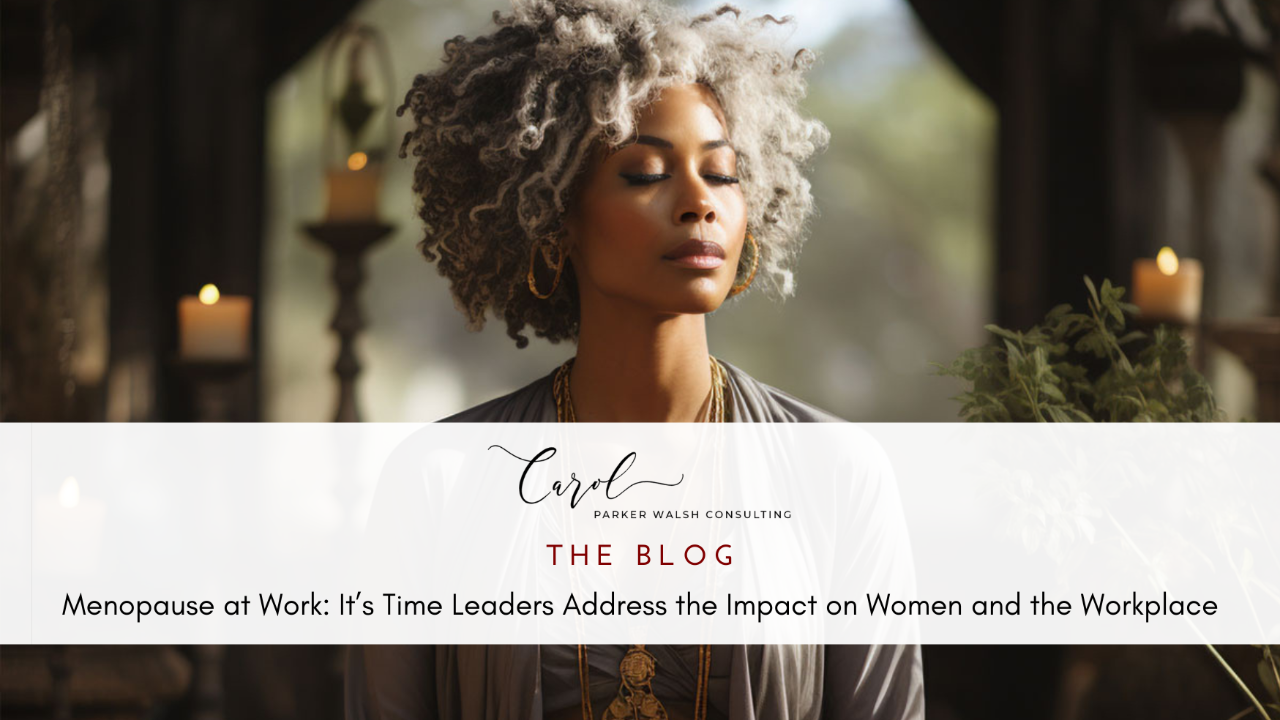Menopause at Work: It’s Time Leaders Address the Impact on Women and the Workplace
Sep 03, 2023
I wrote a brief blog post on this topic three years ago called Menopause and Your Career. Back then, I just wanted to raise awareness and acknowledge that menopause is a real issue that can have a severe impact and consequences on women in the workplace.
I also shared about this on my monthly TV segment on AMNW (you can see the video below).
Menopause is caused by a drop in estrogen levels, which usually takes place for women between the ages of 45 and 55, although for some women, it can last well into their 60s. It's a natural transition in a biological woman's life, marking the cessation of menstrual cycles and fertility. It progresses in three stages: perimenopause, which begins several years before menopause and is characterized by fluctuating hormone levels causing irregular menstrual cycles and symptoms like night sweats and hot flashes; menopause, the point where a woman has not had a menstrual period for 12 consecutive months and is marked by symptoms like dry skin, insomnia, thinning hair, brain fog, depression, and weight gain; and postmenopause, the years following menopause, where hormone levels will remain low and some previous symptoms may wane but additional health risks can emerge such as cardiovascular disease, osteoporosis, and urinary tract infections.
According to the National Institute of Health, it's expected that the number of menopausal and postmenopausal women will reach 1.2 billion by 2030, with 47 million new entrants each year.
Now that I've settled into postmenopause, seeing more attention to this issue is encouraging. Specifically, a few weeks ago, one of Good Morning America's lead stories was about Halle Barry talking about embracing aging and dealing with menopause. The Oscar-winner actively challenges societal perceptions around menopause, saying it's time to rewrite the narrative around women's health. Menopause doesn't need to signal the end, and it's time to pack it in. As she eloquently puts it, "Starting the conversation is the first step," so more women can feel free and comfortable talking about this issue and its impact on their lives and careers.
The effects of menopause cost the U.S. economy a staggering $26.6 billion annually in lost productivity and health costs. A recent Mayo Clinic study surveyed over 4,400 women between 45 and 60 and found that 11% reported taking days off from work due to menopause symptoms like hot flashes and sleep disturbances in the past year.
It's important to note, however, that menopause isn't a uniform experience for all women. Studies show that almost half of Black women suffer severe physical symptoms, such as intense hot flashes and enduring joint pain, compared to white women. Coupled with the disparities black women experience in the workplace, nights filled with discomfort and days overshadowed by pain can significantly impact the experiences of senior Black women in the workplace.
As I've shared, there are real implications on how menopause impacts retention and productivity. According to Biote's 2022 Women in the Workplace Report, 4 out of every ten women reported that menopause symptoms interfered with their work performance or productivity every week,1 out of 4 felt that their menopause symptoms negatively impacted their career development or work-related opportunities, while 17% have quit a job or considered quitting due to menopause symptoms.
Yet even with the apparent impact menopause is having on women at work, there's still a stigma around talking about it and addressing its impact. Women are particularly fearful of discussing issues that may sideline their career progression, from menopause to parenting. But this silent suffering is only making things worse.
So, are we ready to talk about menopause? It's a conversation that extends beyond borders, cultures, and industries. It's about empathy, health and wellness, confronting age and gender bias, and making tangible efforts and changes.
For example:
- Empower Voices: Cultivate a workspace where conversations about menopause are no longer taboo but welcomed and embraced.
- Create Adaptive Environments: Grant employees the autonomy to tailor their workspace for comfort and alleviation of pain, including temperature control, easy restroom access, and ergonomic office equipment.
- Validate the Impact of Menopause: Validate menopause as a legitimate health concern that deserves attention and spearhead powerful campaigns to elevate understanding and rally support for menopausal well-being.
- Challenge Biases: Stand up against gender and age-related biases and bridge the informational divide across all genders.
- Forge Collaborative Partnerships: Forge strategic partnerships to make menopausal relief products accessible and affordable.
Let's be clear: menopause is not just a "women's issue." Although women directly experience its symptoms, the broader implications touch economics, create leadership challenges, and present serious issues that demand our immediate focus.
What solutions have your organization engaged in around this critical topic?
Unlock the #1 Issue Plaguing Today's Leaders
Get The Effective Time Management Guide for Busy Leaders Today!
Time is the scarcest resource leaders have, and how it's allocated matters significantly. As a leader, mastering time management is crucial - it's essential for being present for your team, prioritizing work effectively, and driving your organization forward.
We hate SPAM. We will never sell your information, for any reason.

